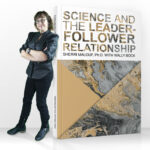Relationships can seem ineffable, as if they are derived from thin air. In my book Science and the Leader-Follower Relationship, I discuss systems science, brain science, and relationship science to explain how the leader-follower relationship really works.
Systems science
All human systems have their genesis in relationships. We influence other people through relationships, convincing them to support our initiatives, and we base decisions on the quality of our relationships. Conscious and unconscious intentions lead to personal interactions. Then, if we are paying attention and are present, we discover whether our impact is positive, negative, or neutral.
As in any relationship, leaders and followers can make the effort to understand the other person as a foundational step to building a stronger connection.
Systems science provides a neat way of breaking down the complexity of the leader-follower relationship and increases our understanding of how to manage it for positive outcomes.
Brain science
We suppress selfish desires in order to be a part of a company, team, or group. It is a powerful trade. Still, many of us do not understand why some people react strongly to events, such as feeling disrespected or that something is unfair. Brain science is behind these reactions, unconsciously pushing buttons. It is a part of our programming and socialisation as children.
Leaders and followers need to understand the dynamics at play in order to have the self-awareness and self-control to make conscious choices and build strong respectful relationships.
Our brain impacts our outlook, needs, and behaviours. Much is unconscious and implicit, rooted in the physics of the brain and childhood experiences. Knowledge about the brain allows us to be less of a victim to its implicit and unconscious powers. Understanding empowers us to take more control, use our brain more powerfully, and connect better with people to develop productive relationships. Indeed, understanding brain science helps us to build stronger leader-follower relationships.
Relationship science
Relationships matter a lot. We have implicit mental models that unconsciously cause us to react to other people. Those mental models begin to be formed when we are young and can be based on how we were raised, and they continue to develop through experiences. We know that our brain creates biological structures that help us handle our relationships. We have unconscious expectations for different relationships. All of these factors mix together into a platform on which we set relationship hopes. We master our connections, we build our relationships, and that drives how we behave with other people in different situations.
The human system puzzle
As in any relationship, leaders and followers can make the effort to understand the other person as a foundational step to building a stronger connection. Building a productive relationship is complex and much of it is unsaid. Understanding the basics of relationship science, system science, and brain science, are foundational pieces of the human system puzzle.
Weaving these and other sciences together in my research, I developed the Implicit Social Elements®.
The Implicit Social Elements®
The relationship between leaders and followers is key to making leadership models work. Many followers feel ignored, hurt, disappointed, and taken for granted. Many leaders feel like they have tried every leadership programme out there and they still feel frustrated when leading people. I realised that they really lacked that connection, that social relationship critical to the success of organisations.
The core of all leadership behaviours is influencing followers to achieve a common goal by triggering their social decision-making processes. This cannot be done without creating a powerful bond and connection through a mutually held and honoured social relationship.
While founded on science and my research, as it turns out, the Implicit Social Elements® contain a lot of common sense. Most of us would appreciate a relationship with high levels of trust, fairness, empathy, reciprocity, status, self-control, and mutual recognition respect – it sounds like heaven!
So, what are the Implicit Social Elements®? They form an unconscious system that uses our implicit knowledge to automatically assess situations and drive how we respond to those situations. I call them ‘elements’, because they are the foundation of all relationships. Some will be more important than others to you, because no two people have the same exact needs.
The seven Implicit Social Elements® can be summarised as follows:
| Trust | Confidence in the honesty or integrity of a person |
| Fairness | Impartial and just treatment of others |
| Self-control | Control thoughts, regulate emotions, and inhibit impulses |
| Empathy | Awareness, understanding, and the sharing of another’s feelings |
| Reciprocity | Mutual benefit in which both parties gain value |
| Status | Acknowledgment of position and prestige |
| Mutual recognition and respect | Respect of individual rights and humanity through recognition of everyone’s worth and dignity |
Science and the Leader-Follower Relationship includes recommendations for both leaders and followers for improving each of the Implicit Social Elements®. From a training perspective, it’s all about influencing skills. This, in turn, will make you more powerful and accountable.
Interested in this topic? Read Connected leadership: holding up the mirror to develop self-awareness.
Relationships can seem ineffable, as if they are derived from thin air. In my book Science and the Leader-Follower Relationship, I discuss systems science, brain science, and relationship science to explain how the leader-follower relationship really works.
Systems science
All human systems have their genesis in relationships. We influence other people through relationships, convincing them to support our initiatives, and we base decisions on the quality of our relationships. Conscious and unconscious intentions lead to personal interactions. Then, if we are paying attention and are present, we discover whether our impact is positive, negative, or neutral.
As in any relationship, leaders and followers can make the effort to understand the other person as a foundational step to building a stronger connection.
Systems science provides a neat way of breaking down the complexity of the leader-follower relationship and increases our understanding of how to manage it for positive outcomes.
Brain science
We suppress selfish desires in order to be a part of a company, team, or group. It is a powerful trade. Still, many of us do not understand why some people react strongly to events, such as feeling disrespected or that something is unfair. Brain science is behind these reactions, unconsciously pushing buttons. It is a part of our programming and socialisation as children.
Leaders and followers need to understand the dynamics at play in order to have the self-awareness and self-control to make conscious choices and build strong respectful relationships.
Our brain impacts our outlook, needs, and behaviours. Much is unconscious and implicit, rooted in the physics of the brain and childhood experiences. Knowledge about the brain allows us to be less of a victim to its implicit and unconscious powers. Understanding empowers us to take more control, use our brain more powerfully, and connect better with people to develop productive relationships. Indeed, understanding brain science helps us to build stronger leader-follower relationships.
Relationship science
Relationships matter a lot. We have implicit mental models that unconsciously cause us to react to other people. Those mental models begin to be formed when we are young and can be based on how we were raised, and they continue to develop through experiences. We know that our brain creates biological structures that help us handle our relationships. We have unconscious expectations for different relationships. All of these factors mix together into a platform on which we set relationship hopes. We master our connections, we build our relationships, and that drives how we behave with other people in different situations.
The human system puzzle
As in any relationship, leaders and followers can make the effort to understand the other person as a foundational step to building a stronger connection. Building a productive relationship is complex and much of it is unsaid. Understanding the basics of relationship science, system science, and brain science, are foundational pieces of the human system puzzle.
Weaving these and other sciences together in my research, I developed the Implicit Social Elements®.
The Implicit Social Elements®
The relationship between leaders and followers is key to making leadership models work. Many followers feel ignored, hurt, disappointed, and taken for granted. Many leaders feel like they have tried every leadership programme out there and they still feel frustrated when leading people. I realised that they really lacked that connection, that social relationship critical to the success of organisations.
The core of all leadership behaviours is influencing followers to achieve a common goal by triggering their social decision-making processes. This cannot be done without creating a powerful bond and connection through a mutually held and honoured social relationship.
While founded on science and my research, as it turns out, the Implicit Social Elements® contain a lot of common sense. Most of us would appreciate a relationship with high levels of trust, fairness, empathy, reciprocity, status, self-control, and mutual recognition respect – it sounds like heaven!
So, what are the Implicit Social Elements®? They form an unconscious system that uses our implicit knowledge to automatically assess situations and drive how we respond to those situations. I call them ‘elements’, because they are the foundation of all relationships. Some will be more important than others to you, because no two people have the same exact needs.
The seven Implicit Social Elements® can be summarised as follows:
| Trust | Confidence in the honesty or integrity of a person |
| Fairness | Impartial and just treatment of others |
| Self-control | Control thoughts, regulate emotions, and inhibit impulses |
| Empathy | Awareness, understanding, and the sharing of another’s feelings |
| Reciprocity | Mutual benefit in which both parties gain value |
| Status | Acknowledgment of position and prestige |
| Mutual recognition and respect | Respect of individual rights and humanity through recognition of everyone’s worth and dignity |
Science and the Leader-Follower Relationship includes recommendations for both leaders and followers for improving each of the Implicit Social Elements®. From a training perspective, it’s all about influencing skills. This, in turn, will make you more powerful and accountable.
Interested in this topic? Read Connected leadership: holding up the mirror to develop self-awareness.





